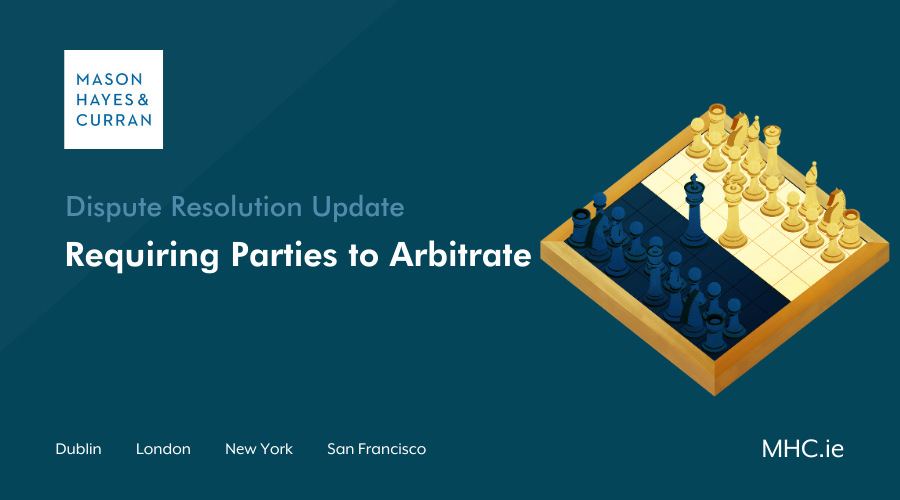Requiring Parties to Arbitrate

The Irish Courts are generally understood to be arbitration friendly. Where parties have chosen arbitration as their dispute resolution method and with limited exceptions, the courts are required to refer the parties to arbitration and to stay any court proceedings. Our Dispute Resolution team looks into this topic.
The Arbitration Act 2010 (Act) imposes a statutory obligation on the Irish courts to refer parties to arbitration with limited exceptions. The UNCITRAL Model Law on International Commercial Arbitration (Model Law) is applicable as a matter of Irish law[1]. Article 8 of the Model Law provides that, where there is an arbitration agreement as defined in the Act[2], the Court is obliged to refer the parties to arbitration and to defer any court proceedings commenced if the relevant criteria are satisfied. Arbitration, for those unfamiliar with it, is a private dispute resolution process whereby, instead of a court, a tribunal appointed by the parties (or through a default mechanism agreed by them) determines agreed issues.
Article 8 – the obligation to stay / refer
The relevant provision setting out the courts’ obligation to defer court proceedings in favour of arbitration is Article 8(1) of the Model Law:
“A court before which an action is brought in a matter which is the subject of an arbitration agreement shall, if a party so requests no later than when submitting his first statement on the substance of the dispute, refer the parties to arbitration unless it finds that the agreement is null and void, inoperative or incapable of being performed.”
For the provisions of Article 8(1) to be engaged[3]:
- An action must have been brought before the court regarding a dispute between the parties
- The action must concern a “matter which is the subject of an arbitration agreement” and arbitration clauses are interpreted broadly reflecting a “presumption that the parties intended a ‘one-stop’ method of adjudication for the determination of all disputes"[4]. Even if the parties expressly provide that certain matters are for arbitration and others for litigation, case law confirms that so long as certain disputed issues are to be determined by arbitration, those issues should be referred to arbitration[5];
- One of the parties must request the reference to arbitration “not later than submitting his first statement on the substance of the dispute”. It is prudent to enter only a conditional appearance prior to the issue of the relevant motion.
If those criteria are met, “the Court must make the reference to arbitration. It is not a question of the court having a discretion to make a reference or not. It is a mandatory obligation"[6]. There is no discretion, the parties must be referred to arbitration and there are many cases confirming this to be the case.
However, Article 8 recognises a number of exceptions to the statutory obligation to refer the parties to arbitration. These are where the court finds that the arbitration agreement is:
- “null and void”, such as where the formal requirements of an arbitration agreement under Article 7 are not met,
- “inoperative”, such as where the subject matter is not arbitrable, for example, by virtue of statute or public policy, or
- “incapable of being performed”, which may include where an arbitration agreement is inoperative.
However, these are the “only circumstances” where the court’s obligation to refer the parties to arbitration does not arise[7]. In addition, “[t]he onus of establishing the existence of one or more of these disapplying factors rests on the party who seeks to rely on them”[8]. Therefore, it is for the party claiming that one of the above referenced circumstances applies to satisfy the court of this. Examples of where this has happened are rare. Ultimately, if the requirements of Article 8(1) to refer a dispute to arbitration are met, only in exceptional cases will the relevant order not be made.
Conclusion
Article 8(1) of the Model Law as adopted by the Act and the Act obliges the Irish courts to refer the parties to arbitration and to defer court proceedings if the parties have an arbitration agreement and the requirements are met. The only circumstances where such an order is unlikely to be made where the requirements are otherwise met are where the arbitration agreement is “null and void”, “inoperative” or “incapable of being performed”. Such scenarios are for the party so alleging to prove and are rare. The Article 8 case law shows that the Irish courts are not slow to refer parties to arbitration and are keen to hold parties to what they have agreed[9]. This means that, in appropriate cases, the parties’ disputes are required to be resolved privately and without burdening the courts through a process which can be faster and more cost-effective than litigation.
For more information and expert advice on bringing such applications, contact a member of our Commercial Disputes team.
The content of this article is provided for information purposes only and does not constitute legal or other advice.
[1] Section 6
[2] Article 7 of the Model Law provides that an arbitration agreement, which must be in written form, is one by which the parties submit to arbitration all or certain disputes for a defined legal relationship, such as a contract.
[3] See, for example, Ocean Point Development Co Ltd v Patterson Bannon Architects Ltd & Ors [2019] IEHC 311.
[4] K&J Townmore Construction Ltd v Kildare and Wicklow Education and Training Board [2018] IEHC 770
[5] Kelly & Anor v Lennon [2009] IEHC 320
[6] Ocean Point Development Co Ltd v Patterson Bannon Architects Ltd & Ors [2019] IEHC 311
[7] Ocean Point Development Co Ltd v Patterson Bannon Architects Ltd & Ors [2019] IEHC 311
[8] Sterimed Technologies International v Schivo Precision Ltd [2017] IEHC 35
[9] BAM Building Ltd v. UCD Property Development Co Ltd [2016] IEHC 582
Share this:



